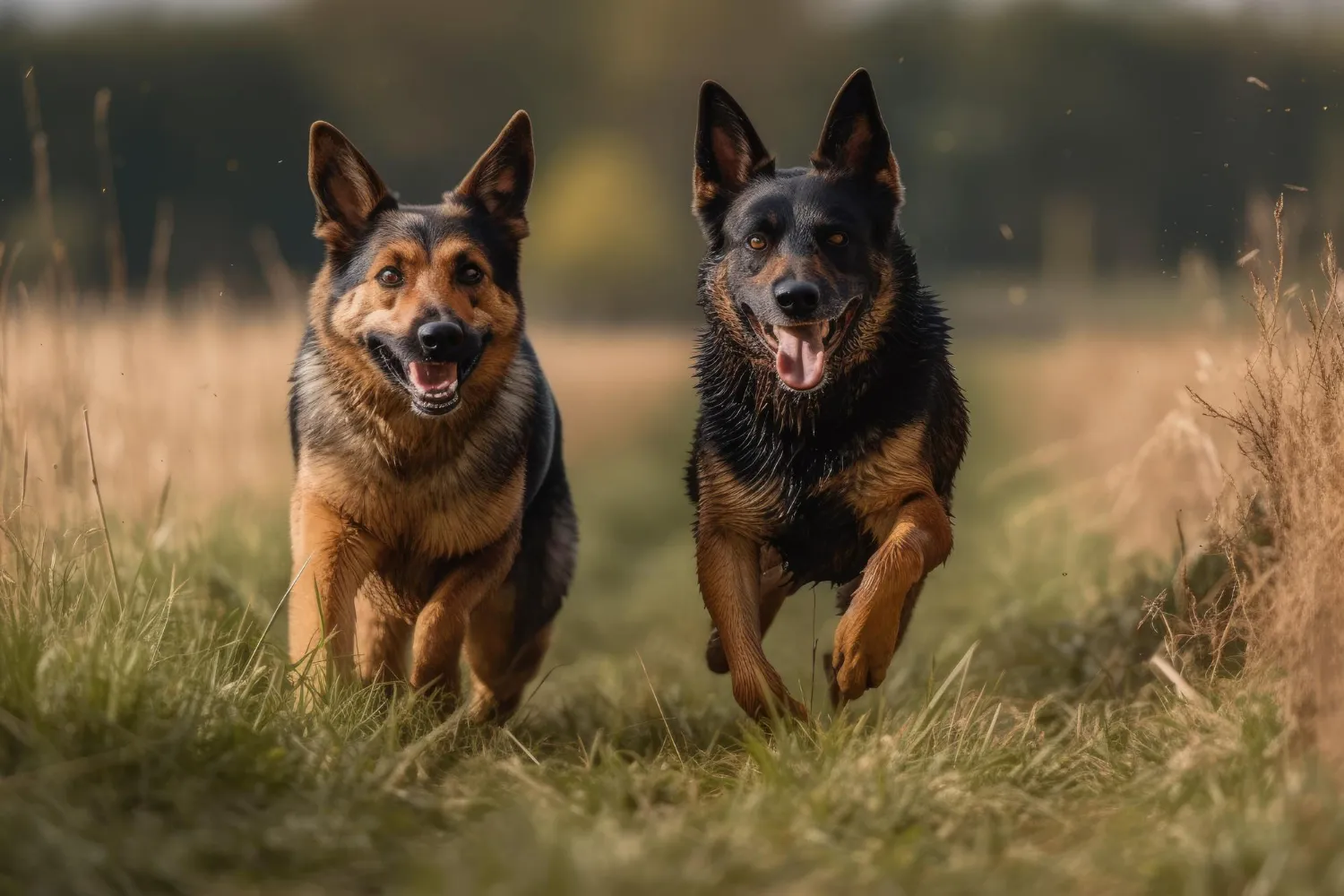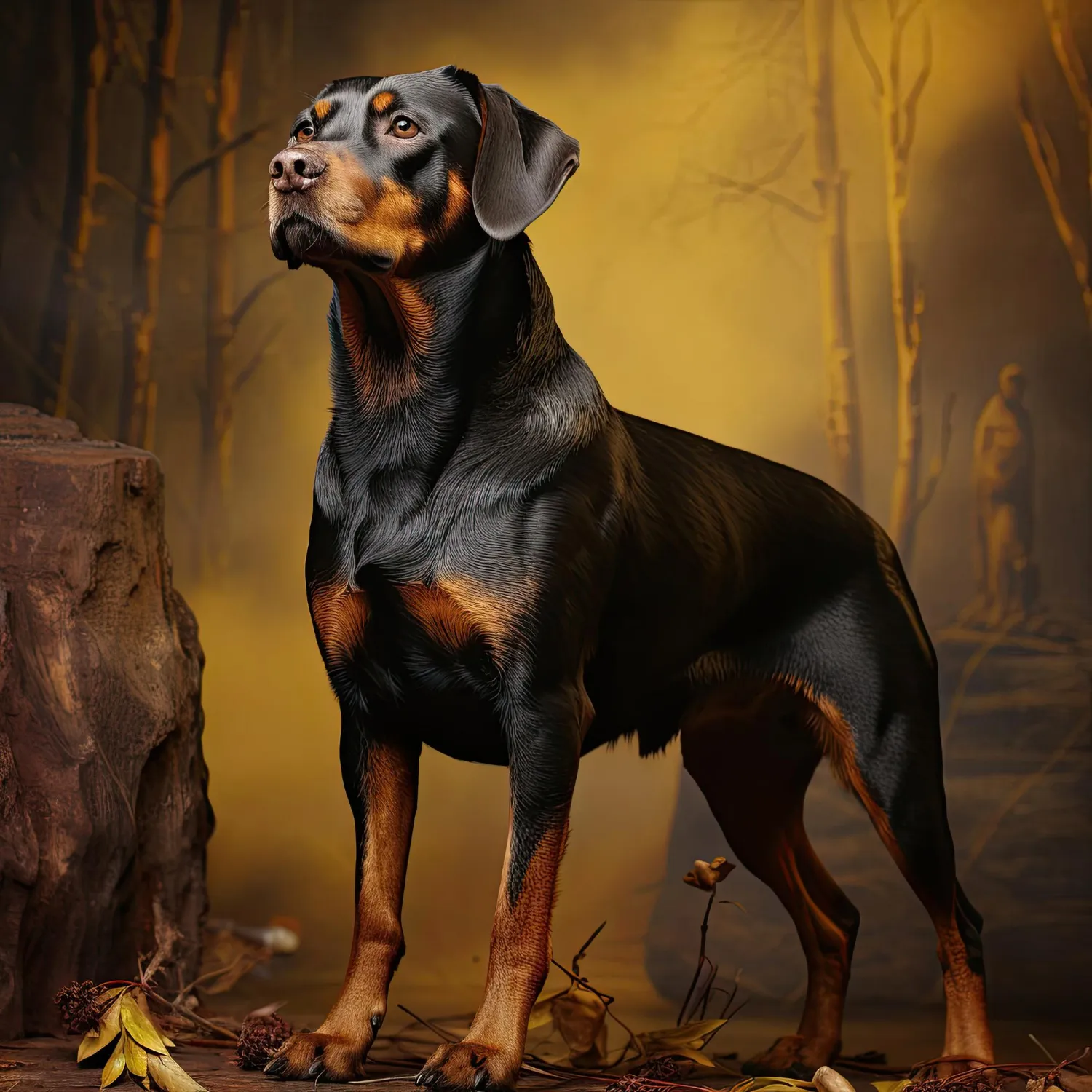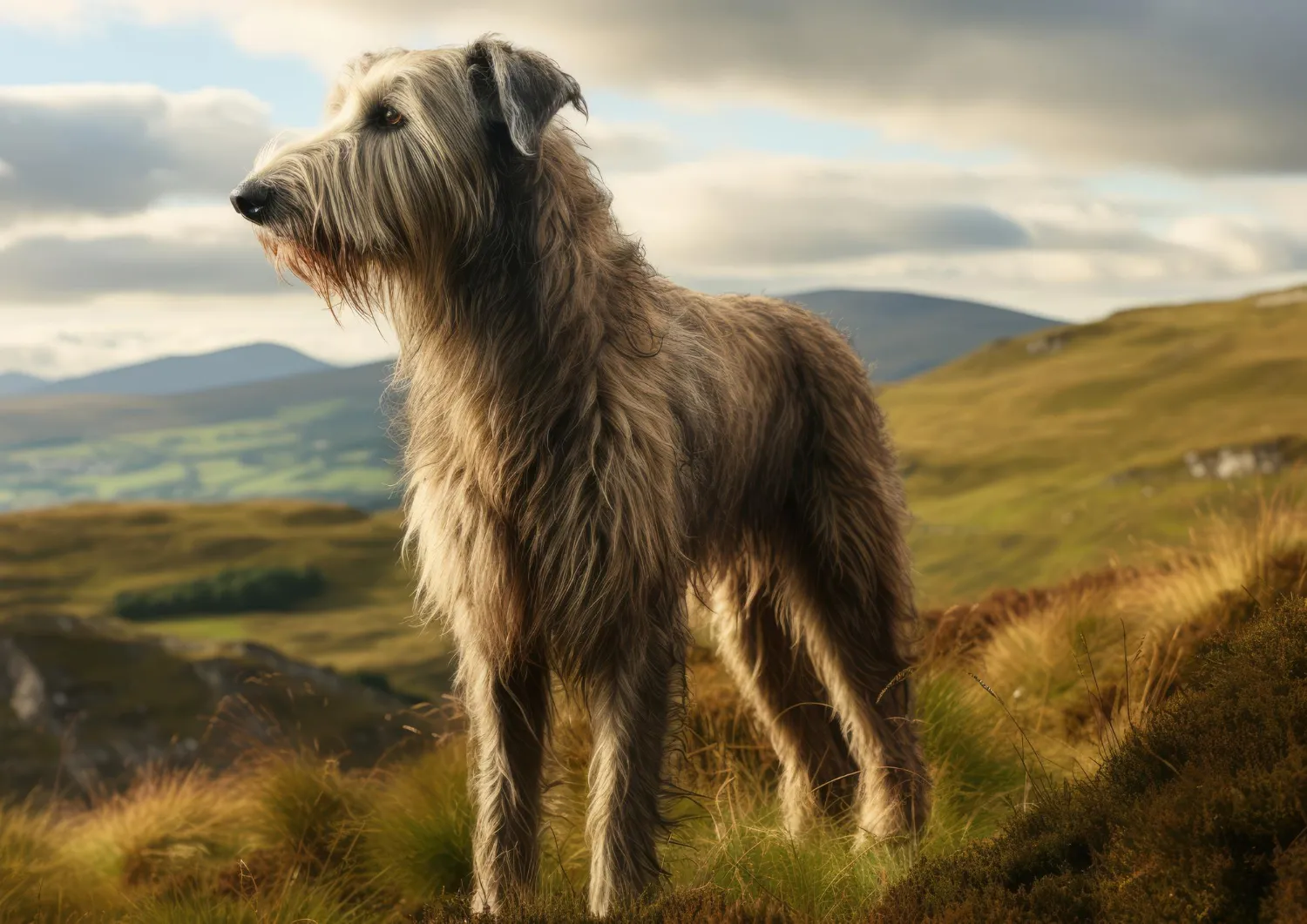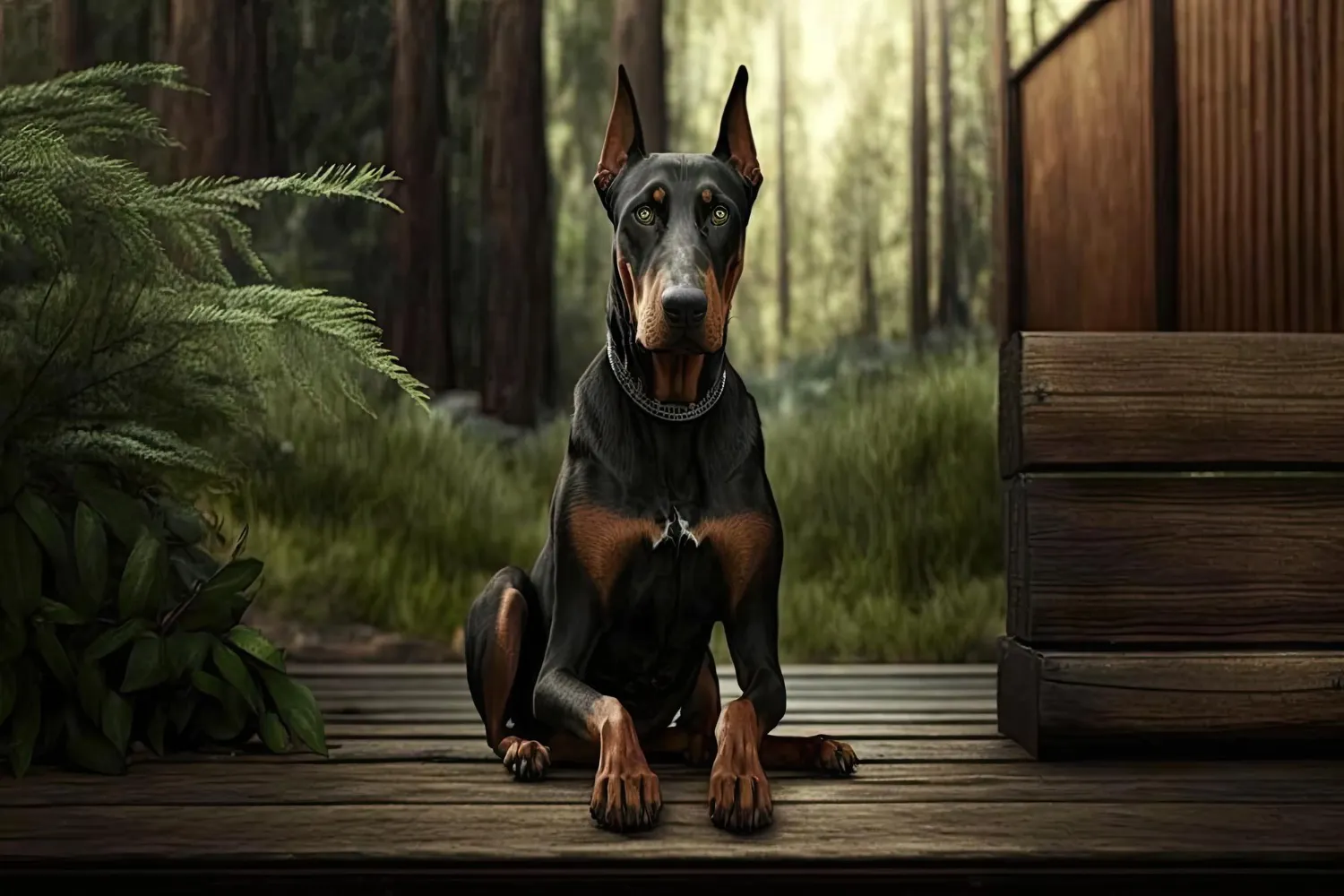Deep-chested dog breeds are a unique group of canines that have a distinct physical characteristic - a deep chest. This physical trait is characterized by a long sternum that extends down the length of the ribcage, giving these breeds a narrow waist and a broad chest. This unique body shape is not only aesthetically pleasing but also serves a functional purpose, allowing these dogs to excel in various activities such as hunting, herding, and even search and rescue.

Some of the most popular deep-chested dog breeds include the German Shepherd, Doberman Pinscher, Boxer, Great Dane, and Rottweiler. These breeds are known for their athleticism, endurance, and strength. However, their deep chest can also put them at risk for certain health conditions, such as bloat, a life-threatening condition that requires immediate veterinary attention. Therefore, it is important for owners of deep-chested breeds to be aware of the potential risks and take necessary precautions to keep their dogs healthy and happy.
Understanding Deep-Chested Dog Breeds
Deep-chested dog breeds are known for their unique physical traits, which include a larger rib cage and a barrel chest. These breeds are often characterized by their high energy levels, stamina, and size, making them popular choices for working and athletic activities.
Defining Deep Chest in Dogs
A deep chest in dogs refers to the shape of their rib cage, which is longer and narrower than other breeds. This allows for a larger lung capacity, which is essential for breeds that require high levels of physical activity. Deep-chested dogs are also known for their prominent shoulders and elbows, which contribute to their overall athletic appearance.
Common Characteristics of Deep-Chested Breeds
Aside from their physical traits, deep-chested breeds share several common characteristics. These dogs are known for their high energy levels and require plenty of exercise to maintain their physical and mental well-being. They are also known for their stamina and can excel in activities such as running, hiking, and swimming.
Some common deep-chested breeds include the Great Dane, Boxer, Doberman Pinscher, and Greyhound. These breeds are often used in various working roles, such as search and rescue, police work, and hunting.
In conclusion, understanding deep-chested dog breeds is essential for pet owners who are considering adopting one of these unique breeds. By recognizing their physical traits, energy levels, and size, owners can provide the necessary care and exercise to ensure their dog's health and happiness.
Health Concerns for Deep-Chested Canines
Deep-chested dog breeds, also known as large or giant breeds, are prone to certain health concerns that are unique to their body type. These breeds have a deep and narrow chest, which can put them at risk for several health issues.
Bloat and Gastric Issues
One of the most common health risks for deep-chested canines is bloat, also known as gastric dilatation-volvulus (GDV). This is a serious and potentially life-threatening condition that occurs when a dog's stomach fills with gas and twists on itself. This can lead to a blockage of blood flow and cause the stomach tissue to die. Symptoms of bloat include vomiting, restlessness, and a distended abdomen. If left untreated, bloat can lead to shock and death.
Respiratory and Circulatory Health
Due to their deep chest, some deep-chested breeds may also be prone to respiratory and circulatory problems. Dogs with a narrow chest cavity may have difficulty breathing, especially during exercise or strenuous activity. This can lead to reduced lung capacity and poor circulation, which can put a strain on the heart and other organs.

Exercise-Induced Risks
While exercise is important for all dogs, deep-chested breeds may be at a higher risk for exercise-induced health issues. Strenuous exercise can put a strain on the diaphragm and other organs, which can lead to difficulty breathing and other health concerns. It is important to monitor these dogs during exercise and ensure that they are not overexerting themselves.
Overall, deep-chested dog breeds require special attention to their health needs. Regular check-ups with a veterinarian and proper exercise and diet can help prevent or manage many of these health concerns.
Popular Deep-Chested Dog Breeds
Deep-chested dog breeds are known for their unique body structures and have been bred for various purposes such as hunting, guarding, and companionship. In this section, we will discuss some of the most popular deep-chested dog breeds.
Large and Giant Breeds
Great Danes, Irish Wolfhounds, and Saint Bernards are some of the largest dog breeds with deep chests. These breeds have been historically used for hunting and guarding. Great Danes are known for their gentle temperament and are often referred to as "gentle giants." Irish Wolfhounds are known for their loyalty and make great family pets. Saint Bernards are also known for their loyalty and are often used in search and rescue operations.

Medium to Large Breeds
Dobermans, Boxers, Greyhounds, Rottweilers, and Labrador Retrievers are some of the most popular medium to large dog breeds with deep chests. Dobermans are known for their intelligence and loyalty, while Boxers are known for their playful and energetic nature. Greyhounds are known for their speed and make great racing dogs. Rottweilers are often used as guard dogs and are known for their protective nature. Labrador Retrievers are one of the most popular dog breeds and are known for their friendly and loyal personalities.
Small to Medium Breeds
Basset Hounds, Corgis, and Standard Poodles are some of the small to medium dog breeds with deep chests. Basset Hounds are known for their excellent sense of smell and are often used for hunting. Corgis are known for their intelligence and make great family pets. Standard Poodles are known for their intelligence and are often used in dog shows.
In conclusion, deep-chested dog breeds come in various sizes and have unique personalities and traits. When looking for a dog, it is important to consider their breed characteristics and temperament to ensure a good fit for your lifestyle.
Caring for Deep-Chested Dogs
Deep-chested dog breeds are known for their unique body structure, which makes them prone to certain health issues. However, with proper care and attention, these issues can be minimized, and these dogs can live happy, healthy lives.
Diet and Feeding Habits
One of the most important aspects of caring for a deep-chested dog is to pay close attention to their diet and feeding habits. These dogs are prone to a condition called bloat, which can be life-threatening. To prevent bloat, it is important to feed them smaller meals throughout the day, rather than one large meal. Additionally, it is important to avoid feeding them foods that are high in fat or that contain ingredients that they may be allergic to.
Exercise and Physical Activities
Deep-chested dogs have a lot of energy and stamina, and they require regular exercise to stay healthy and happy. They enjoy running, hunting, and agility activities, and they also benefit from mental stimulation. However, it is important to avoid over-exercising them, as this can lead to exhaustion and injury.
Mental and Emotional Well-being
Deep-chested dogs are known for their loyal and protective nature, but they can also be prone to anxiety and other emotional issues. To promote their mental and emotional well-being, it is important to provide them with plenty of socialization and positive reinforcement. They also benefit from having a regular routine and a comfortable living environment.
Overall, caring for a deep-chested dog requires a combination of attention to their physical and emotional needs. By providing them with the right diet, exercise, and mental stimulation, these dogs can live happy, healthy lives.
Preventive Measures and Emergency Care
Recognizing and Preventing Bloat
Bloat, also known as gastric dilatation-volvulus (GDV), is a serious health concern for deep-chested dog breeds. It is a condition in which the stomach fills with gas and twists on itself, cutting off blood flow to vital organs. This can lead to difficulty breathing, shock, and even death.
To prevent bloat, it is recommended to feed your dog smaller meals throughout the day instead of one large meal. Avoid feeding your dog immediately before or after exercise, and make sure they have access to fresh water at all times. It is also advised to avoid feeding your dog from raised bowls, as this has been linked to an increased risk of bloat.
If you suspect your dog is experiencing bloat, seek emergency veterinary care immediately. Symptoms of bloat include a distended abdomen, restlessness, drooling, and unproductive vomiting. Early recognition and treatment are essential to prevent serious complications.
Routine Health Check-Ups
Regular health check-ups are important for all dogs, but especially for deep-chested breeds. These check-ups allow for early detection and treatment of any health concerns, including bloat. It is recommended to schedule check-ups with a veterinarian at least once a year, or more frequently if your dog has a history of health issues.
During these check-ups, your veterinarian will perform a physical exam and may recommend additional tests or screenings. They may also discuss preventative measures, such as a proper diet and exercise plan, to keep your dog healthy.
Emergency Situations and First Aid
Despite our best efforts, emergencies can still happen. It is important to be prepared for these situations and know what to do in case of an emergency.
Pet insurance can provide financial assistance in case of an emergency, but it is important to read and understand the policy before purchasing. It is also recommended to have a first aid kit on hand, including items such as gauze, bandages, and antiseptic solution.
If your dog is experiencing an emergency, such as difficulty breathing or uncontrolled bleeding, seek veterinary care immediately. In some cases, administering first aid may be necessary to stabilize your dog before transport to a veterinary hospital. However, it is important to remember that first aid should never replace proper veterinary care.
Behavioral Traits of Deep-Chested Breeds

Deep-chested dog breeds are known for their unique physical appearance, but they also have distinct behavioral traits that set them apart from other breeds. Here are some common behavioral traits of deep-chested breeds:
Gentle Giants
Many deep-chested breeds are large in size and have a gentle nature. They are often referred to as "gentle giants" and are known for their calm and patient demeanor. These breeds are great with children and make excellent family pets.
Loyalty
Deep-chested breeds are known for their loyalty to their owners. They are highly protective of their family and will go to great lengths to keep them safe. This loyalty makes them great guard dogs and watchdogs.
Guarding
Deep-chested breeds have a natural instinct to guard and protect. They are highly alert and will bark to alert their owners of any potential danger. This guarding instinct can make them territorial and protective of their home and family.
Canine Companion
Despite their guarding instincts, deep-chested breeds make great canine companions. They are affectionate and love to spend time with their owners. They thrive on human interaction and need plenty of exercise and mental stimulation to stay happy and healthy.
In conclusion, deep-chested breeds have unique behavioral traits that make them great family pets and loyal companions. Their gentle nature, loyalty, guarding instincts, and love for human interaction make them a popular choice among dog owners.
Conclusion
In conclusion, deep chested dog breeds require special attention to maintain their health and well-being. Exercise is crucial for these breeds, as they are prone to certain health issues such as bloat and torsion. Owners should ensure that their dogs get enough exercise and avoid overfeeding them to prevent obesity.
Feeding habits should also be taken into consideration as certain foods can trigger bloat in deep chested breeds. Owners should consult with their veterinarian to determine the best diet for their pet.
Overall, deep chested breeds can make wonderful companions, but it is important to be aware of their unique needs and potential health risks. With proper care and attention, these breeds can live long and healthy lives.




